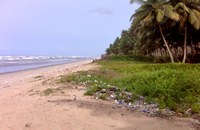Ghana

Ghana’s coastline extends for about 550km and is generally low lying (≤ 200m above sea level). The coastal zone of Ghana abounds in rich marine ecosystems coupled with considerable historical monuments. In Ghana, tourism is an emergent key source of national income and is currently the fourth largest foreign exchange earner in the country. Its peaceful atmosphere and stable political climate make it a good choice for investors.
Ghana Demonstration Project: Eco-tourism and Poverty alleviation
The demonstration project aims to strengthen existing environmental policy, legislation and institutional arrangements for encouraging and achieving better environmental management in Ghana’s smaller hotel sector through a combination of both regulatory and voluntary initiatives. It is expected that the demonstration project will also help to create markets in the supply of environmental products and services as well as support the growth of eco-tourism. Its peaceful atmosphere and stable political climate make it a good choice for investors. As far as coastal tourism is concerned, the country is endowed with a wide range of both natural and historical potentialities. Thus, Ghana’s coastline extends for about 550km and is generally low lying (≤ 200m above sea level). The coastal zone of Ghana abounds in rich marine ecosystems coupled with considerable historical monuments. Generally concentrated along the coast are attractive old forts and castles built by Europeans during the period 1482 to 1837. The forts and castles which initially served as trading posts for the trade in gold and ivory were later used as slave dungeons and transit points for slaves who were shipped to the Americas. Currently a number of the forts and castles including Cape Coast and Elmina castles have been designated as UNESCO World Heritage Sites. Ghana’s castles attract several thousand international and domestic tourists annually.
It must be noted that all along the coast of Ghana, relatively improved road infrastructure is available. Ghana is one West African country with high class resort (e.g. La Palm Royal Beach Hotel, Elmina beach resort as well as Busua beach resort). However, poor sanitation and management of human wastes in the coastal settlements could adversely affect patronage of beaches by foreign tourists. In addition, sewage pollution from major cities, like Abidjan in Cote d'Ivoire, has in the past resulted in algal blooms on the western coast of Ghana, which besides creating serious problems for artisanal fishermen also reduces the aesthetic value of the beaches. Plastic bags and other solid waste constitute in several points of the coast a serious concern. This has recently led to a project of collection and recycling of plastic in Central region of Ghana.
Integrated Sustainable Eco-tourism Destination Planning
 At the end of the planning phase for the COAST project (mid 2006) each partner country had produced (with consultant support) a narrative project document describing in general terms the proposed demonstration project(s). There was no logical framework, no work plan, and only a total budget figure (see below) to guide stakeholders in beginning to implement the project. From January 2009 through to June 2009, based upon a one week visit by the Technical Coordinator to each partner country (during the Inception period of the COAST project) a revised narrative, new logical framework, first year work plan and indicative GEF support budget were developed and discussed. Subsequent to each country visit further support has been provided through email discussions. This demonstration project document now provides a more concise definition of the activities and outputs which are expected to be undertaken at the two sites in Ghana. This short note highlights what are foreseen to be the main challenges in now starting to implement the work. This paper has been written as a subsidiary contribution to the general overview provided in the Inception Report.
At the end of the planning phase for the COAST project (mid 2006) each partner country had produced (with consultant support) a narrative project document describing in general terms the proposed demonstration project(s). There was no logical framework, no work plan, and only a total budget figure (see below) to guide stakeholders in beginning to implement the project. From January 2009 through to June 2009, based upon a one week visit by the Technical Coordinator to each partner country (during the Inception period of the COAST project) a revised narrative, new logical framework, first year work plan and indicative GEF support budget were developed and discussed. Subsequent to each country visit further support has been provided through email discussions. This demonstration project document now provides a more concise definition of the activities and outputs which are expected to be undertaken at the two sites in Ghana. This short note highlights what are foreseen to be the main challenges in now starting to implement the work. This paper has been written as a subsidiary contribution to the general overview provided in the Inception Report.
Demo site: Ada Beach Area
Theme: Eco-tourism
Management Team
|
TEAM |
NAME |
|
DEMO PROJECT COORDINATOR |
Mr. Agyeman YAW DICKSON |
|
TOURISM FOCAL POINT |
Dr. Joel SONNE |
|
ENVIRONMENT FOCAL POINT |
Mr. Kwamena ESSILFIE QUAISON |



















